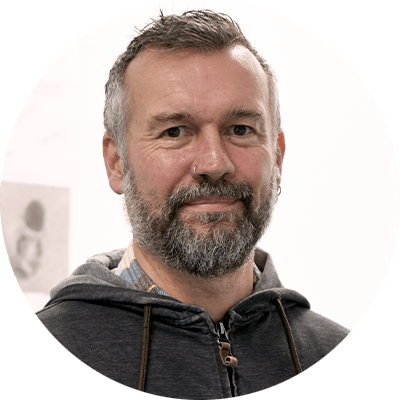About 100,000 years ago, modern humans (Homo sapiens) travelled out of Africa and successfully dispersed to all corners of the globe. Using the very latest techniques, Flinders geoarchaeologist Mike Morley studies the sediments preserved in ancient landscapes to understand when, where and how our ancestors lived, thrived and survived.
Despite what lost civilisation movies would have you believe, most archaeological sites do not host obvious signs of human habitation.
Clues about past lives are often incredibly subtle. Charcoal from fireplaces, tiny fragments of bone and tools, and even DNA from bodies can survive many thousands of years buried in the landscapes where humans and their relatives once lived. These remnants are only recoverable with the right techniques.
Associate Professor Mike Morley is a specialist in revealing the hidden histories of landscapes. With expertise in geoarchaeology – where geology and geography meet archaeology – he studies how landscapes formed and changed over time and reveals traces of ancient humans and their lives in the sediments buried beneath our feet.
“Simply put, our work aims to understand human adaptation to different environments across time,” he says. “To do that, we study sediments – a common factor across all archaeological sites.”
Sediment includes everything – dirt, rocks, plant remnants and degraded signs of life – that is deposited across landscapes by gravity, wind and water.
“The laying down of sediments locks crucial information into place about a site’s history,” he says. “We extract whole blocks of intact sediment from field sites in Africa, Europe, Asia and Australia, take them back to our Microarchaeology Laboratory, preserve them and study them.”
Some of this sediment block is soaked hard in resin and turned into microscope slides. It’s an approach termed micromorphology, the archaeological equivalent of cutting pieces from a decorated layer cake and storing them in perpetuity with the ingredients, layers and inclusions all locked exactly in place.
“By looking at slices of the sediment block at varying degrees of magnification, we can work out how the site formed, how it was preserved and degraded, and examine any signs of human occupation,” says Associate Professor Morley.
His work on sediments has contributed to globally renowned research describing discovery sites of extinct human-like species such as the Denisovans in Siberia and Homo floresiensis (dubbed 'the hobbit') in Flores, Indonesia.
An exciting future beckons for microarchaeology, as Associate Professor Morley’s recently published work with colleagues from the Max Planck Institute in Germany revealed that blocks of preserved sediment also lock in biological molecules that can be extracted and studied in the laboratory.
“We’ve shown fragments of DNA from humans or closely related species such as Neanderthals and Denisovans can be identified in our preserved sediment blocks – a finding that is potentially a game-changer,” he says. “Now we can go back and study existing sediment blocks from a range of sites, which could open up a whole new body of evidence about where humans and their ancestors lived.”
“By looking at slices of the sediment block at varying degrees of magnification, we can work out how the site formed, how it was preserved and degraded, and examine any signs of human occupation,”
Associate Professor Morley was awarded a prestigious Australian Research Council Future Fellowship to apply his techniques to better understand the dispersal of early humans eastwards from Africa into Southeast Asia, and beyond into Australia. The work was put on hold due to travel restrictions over 2020 and 2021.
“I’m delighted to be able to resume this work in early 2023, and will be travelling to Laos, Vietnam, Thailand, Indonesia and East Timor to collect samples, as well as various sites across Australia,” he says. “I’m interested to understand these past landscapes – what the areas looked like, whether rivers flowed through them and the sorts of vegetation that grew.”
New evidence about the nature of former landscapes in Asia and Australia will help scientists better understand how humans and related human species such as Homo floresiensis (identified in Indonesia), Homo luzonensis (identified in the Philippines) and the Denisovans (first identified in Siberia but now evidenced in Laos) survived and maybe even co-existed with members of our own species, Homo sapiens, in this region more than 50,000 years ago.
While COVID-related travel restrictions temporarily closed a door, another one opened: Associate Professor Morley’s research opportunities in Australian landscapes have expanded significantly in recent years.
“I’m working with colleagues on sites in Southern Queensland where Aboriginal huts called gunyahs were constructed in the past,” he says. “We’re looking in sediments for evidence of preserved floor surfaces to see how long those houses were used over time, to learn what kinds of fuel were used for fireplaces and to reveal other hints about the past lives of people living here.”
Associate Professor Morley has also been working closer to home at Naracoorte Caves in South Australia, using his micromorphology technique to better understand the history of the important paleontological record in the caves and reconstruct the way the site and immediate landscape has changed through time.
“For us living in urban areas today, we tend to forget how dynamic our world can be,” he says. “Revealing past landscapes and exploring how early humans lived and responded to their environments is what I find really fascinating.”
“Revealing past landscapes and exploring how early humans lived and responded to their environments is what I find really fascinating.”
![]()
Sturt Rd, Bedford Park
South Australia 5042
South Australia | Northern Territory
Global | Online
CRICOS Provider: 00114A TEQSA Provider ID: PRV12097 TEQSA category: Australian University










